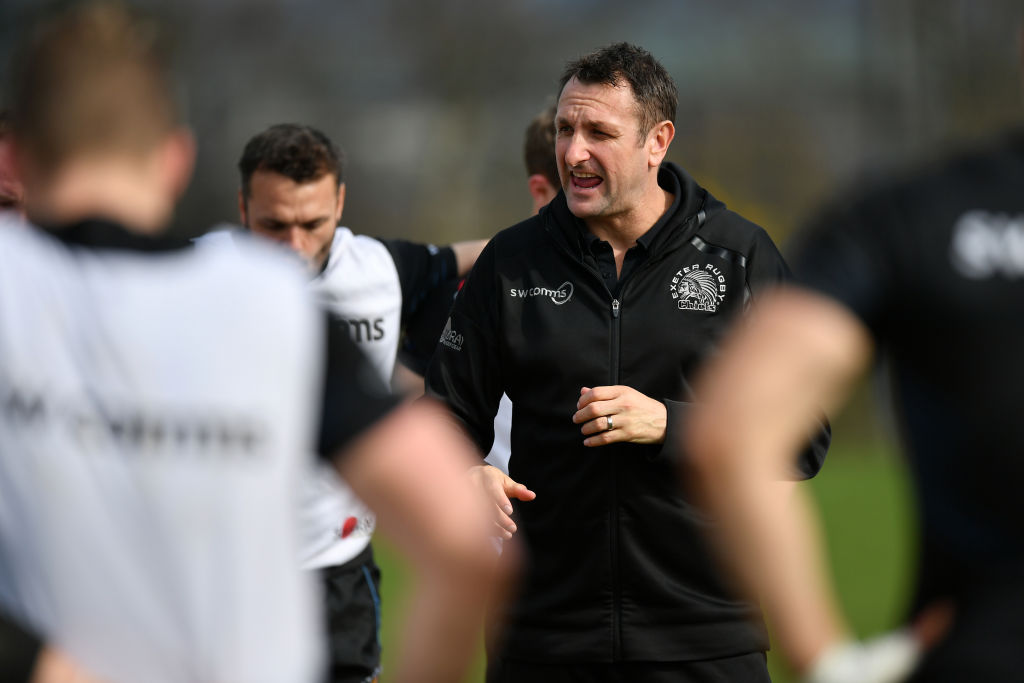
Pub quiz question: which two Exeter Chiefs coaches possess Heineken Cup winners’ medals? The first one is relatively easy, that would be head coach Ali Hepher, whose playmaking abilities from fly-half helped Northampton grind out a 9-8 final victory over Munster in 2000.
And the second? Ten bonus-points if you correctly identified Ricky Pellow, Exeter’s skills coach and a former livewire scrum-half who sat on Bath’s bench when they defeated Brive in 1998.
Neither playing career hit the heights. Hepher suffered an ACL injury which ruined his chances at Saints before he turned to coaching at Bedford; Pellow, meanwhile, played for Worcester, Manchester and Cornish Pirates before becoming player-coach at the now defunct Mounts Bay.
What cannot be disputed now, though, is the huge influence both men have had at Exeter since joining the club in 2009 – a decade that has seen the Sandy Park outfit rocket into the wider rugby public’s consciousness since winning promotion from the Championship in 2010.
Premiership winners in 2017, Exeter now have their sights set on conquering Europe after winning all four of their Heineken Champions Cup group matches to date. So, who better to discuss their prospects of going all the way with than two men who know what it takes?
Are Chiefs ready to challenge? “Yes, we’ve been in that position for a couple of years,” Hepher, 45, told The Rugby Paper. “It’s just been little things – the odd fixture, the odd slip up here and there – that has cost us and probably more than anything it’s been our home form.
“The reality is we’ve picked up good wins on the road but we’ve lost home games to Gloucester and Leinster, and we drew with Munster last year which put us on the back foot, so that’s been a big focus for us this year and we were pleased with home wins over Glasgow and Sale.
“Having been involved in the Heineken Cup as a player, you’ve got to keep backing up your wins and target the next game. There’s no games where you can ease off because you can put yourself out of certain situations like home quarter-finals or top seedings, so there’s still plenty to play for in our last two group fixtures against Glasgow and La Rochelle in the New Year.”
Pellow is equally convinced Chiefs are equipped. He said: “It’s about learning from year to year. We’ve put in some really good performances over the years in big games but, as Ali says, then come unstuck, so if you want to go and win the competition you’ve got to learn from previous campaigns and put that into practice.
“I think we’ve done that this year, which is pleasing, and with the group of players we have now, it’s all in their hands. If we keep everything moving forward, we’ll be in a strong position.”
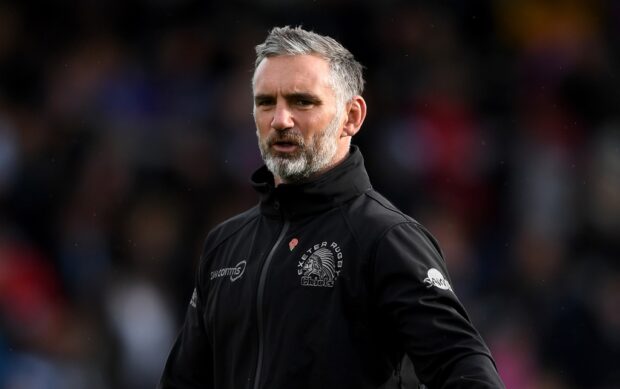
Reflecting on the nature of Bath’s success in 1998, Pellow, who was Andy Nicol’s understudy at the time, added: “There was a strong group of players and it was a strong period for the club. It was the first opportunity for an English side to put a marker down in that competition and we had a group of very experienced players who’d played a lot of international rugby.
“They’d enjoyed a lot of domestic success and it all came together at the right time. It showed that if you have a good backbone in key positions at No.8, nine, ten and in the centres, you’ve got a good chance of moving forward – and that’s where we feel Exeter are now.”
While Bath could call on the experienced Nicol, Jeremy Guscott, Jon Callard, Dan Lyle and Mike Catt, Northampton’s Heineken Cup victory a couple of years later was founded on the equally formidable forces of Pat Lam, Gary Pagel, Budge Pountney and Paul Grayson.
Hepher recalls: “It was built on real strong leadership and a pack of forwards that was one of the best around in those days, which enables you to win games. We had to fight our way through every fixture that season because we also got to the final of the Tetley’s Bitter Cup.
“We were top of the league in March as well but then we ran out of legs and steam a bit. We ended up having to win our last league game to get into Europe the next year and lost that Tetley’s final to Wasps, but we learnt from it and were able to bring a bit more out for Munster.”
While Exeter continue to move inexorably towards their ultimate goal – they were top of both the Premiership and their Heineken Cup pool heading into Christmas – critics, most notably Stuart Barnes, continue to have a pop at their penchant for scoring close-range tries. As the men in charge of the club’s attack, do Hepher and Pellow take any of the ‘boring’ jibes to heart?
Hepher replies: “In an ideal world you’d love to finish more long-range tries – and actually, we have scored some beauties recently like Stuart Hogg’s at Sale and Tom O’Flaherty against Wasps.
“What people always forget, though, is it takes a lot of work to get into the number of close-range scoring positions we do, and then it takes real quality in the ‘kill zone’ to make sure you convert those opportunities however you need to – and we’re pretty good at doing that.
“I recognised years ago that if you pull a ball back out of there, you just give a team an opportunity to get at you and defend it. So, Rob Hunter, our forwards coach, adds the detail to those close-range situations and the work Ricky does as our skills coach is phenomenal.
“With Rob Baxter’s input as well, we all work together to come up with solutions. Our strike rate is good and the end product is successful, so we feel we’re a team that can attack from all angles and it’s pleasing to work with a group like that.”
Pellow believes critics should pay more attention to the skills involved in nailing those close-range tries, particularly from forwards not all that renowned for their dexterity.
He said: “People look at the flashy stuff sometimes but we’re more about making good decisions. If we work a lot on our hand-eye stuff and skills, they’ll all do that naturally.
“I’ve learnt over the years that you can practice all the fancy offloads you like, but actually it’s the little bits that glue everything together. It’s nice for a spectator to see the flashy bits but I’d rather see a ball in two hands, get it into space quickly and players making good-decisions.
“A great example is someone like Geoff Parling when he was with us. He probably wouldn’t want to hear this but he came here as an England international who’d built his whole game around the lineout, but he actually struggled with little passes and the speed of our link play.
“He didn’t need to do 12-15 metre passes but what he did need to be able to do were the little ones, so we worked on that and two years after joining us we won the Premiership. You get guys who are naturally talented but these are the successes that give you the most pleasure.”
With Pellow and Hepher extending their contracts at Chiefs along with Baxter and Hunter, Europe’s biggest trophy seems within reach. All the ingredients are there and they have coaches who own the T-shirt.
NEALE HARVEY

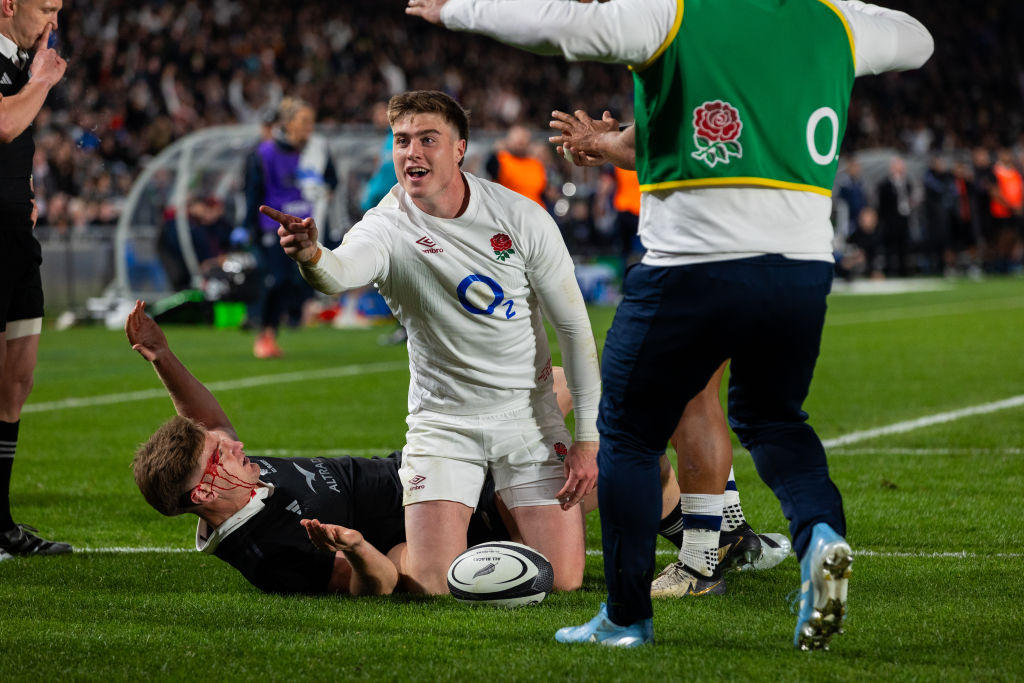
British and Irish Lions
From Leicester reject to a British and Irish Lion: Tommy Freeman’s stellar rise
Latest News
Steve Diamond: Franchise league a good idea

International Rugby
Touring Japan with Wales is my goal says Dan Edwards
















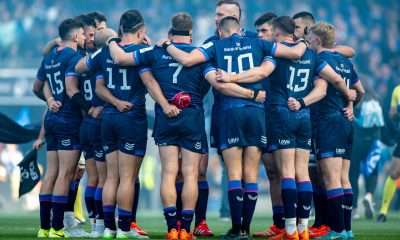

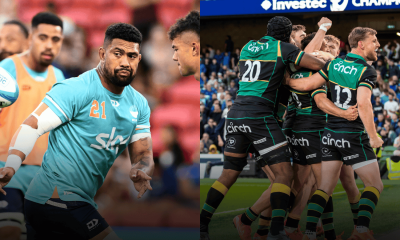

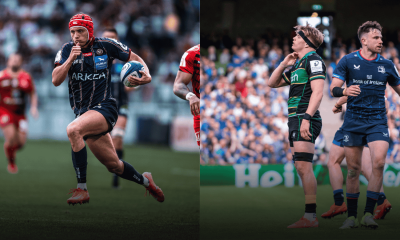

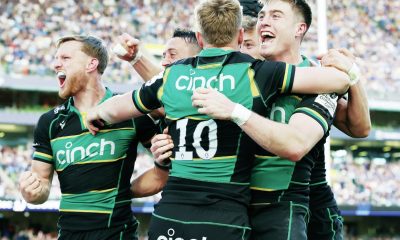

You must be logged in to post a comment Login